Fg – Disease and Drought 28: 15-24
Disease and Drought
28: 15-24
Disease and drought DIG: What would trigger these curses? Paraphrase the curses in 28:16-19 in modern terms. What areas of life are covered? How do they relate to the blessings in 28:3-6? How is the word confusion significant? What is striking about the contrast? What if God were merely a God of blessing? Is the phrase “until you are destroyed” overstated? Why? Why not?
REFLECT: What would be your response to ADONAI if you faced these curses today? Are the modern-day curses any less horrible? Why do people continue to rebel against God? How do these curses fit with your understanding of YHVH? If not in the form of curses, how do you experience God’s discipline today? To what lengths would you go to escape these curses?
Whereas blessing was pronounced for obedience in every undertaking of your hand (28:8), now there is the prospect of cursing in every undertaking.
Basic statement of the covenantal curses (28:15): Moshe clearly defines the people on whom the curses will fall, namely, those who do not obey the stipulations of the covenant (to see link click Cr – The Specific Stipulations of the Covenant). But if you will not listen to the voice of ADONAI your God, to take care to do all His mitzvot and statutes that I am commanding you today, all these curses will come on you and overtake you (28:15). The presence of this curse language, also found in various ancient Near Eastern treaties, emphasizes the seriousness of spiritual adultery in Isra’el’s relationship with YHVH.596
Specific conditional curses of ADONAI (28:16-19): The blessings of verses 3-6 and the curses of verses 16-19 are concerned with the same issues but reflect opposite results, depending upon Isra’el’s obedience or disobedience. Disobedient Isra’el will find history inverted. Instead of the Abrahamic blessing of national growth and greatness, it will wither away to insignificance and exile from the Land.597
Cursed will you be in the city, and cursed will you be in the field (28:16).
Cursed will be your basket and your kneading bowl (28:17).
Cursed will be the fruit of your womb, the produce of your soil, the increase of your herd and the young of your flock (28:18).
Cursed will you be when you come in, and cursed will you be when you go out (28:19).
Moshe then elaborated on the specific conditional curses in verses 28:16-19, which were an elaboration of the specific conditional blessings of 28:3-6. Here, in 28:20-68, Moses pronounced eleven curses that Isra’el would suffer if she did not live wholeheartedly in accordance with God’s mitzvot (see Ez – Statutes, Mitzvot, and Ordinances). Each individual curse essentially had one goal: to turn Isra’el from disobedience.598
1. Horrible destruction (28:20): Disobedience to God’s mitzvot would result in a series of calamities. ADONAI will send on you cursing, causing total confusion (Hebrew: from the root mehumah, meaning panic and turmoil). The word confusion is significant, and refers to confusion that can be caused by war (First Samuel 14:20; Isaiah 22:5; Ezeki’el 22:5; Zechariah 14:13). Normally the climax of a Holy War (see Ag – The Problem of Holy War in the TaNaKh) was the panic sent by Ha’Shem into the enemy. Mehumah is something like the term Jeremiah used, magor-missabib, or terror on every side (Jeremiah 20:3) to describe the panic that resulted from the coming invasion of the Babylonians (see the commentary on Jeremiah Da – Jeremiah and Pash’chur). The contrast is striking. In the day of cursing it will be Isra’el that is overtaken by panic, not her enemies. And frustration in every undertaking of your hand that you will do (28:20a). God sent the curses, but Isra’el invited them by her deeds. The cause of all this, and the essence of Isra’el’s rebellion was that she would chase after foreign gods and reject YHWH.599
Until you are destroyed and perish quickly, because of the evil of your deeds by which you have abandoned Me (28:20b). The statement until you are destroyed occurs six times in this chapter (here, verses 24, 45, 48, 51, 61) like repeated hammer blows. This experience of covenantal cursing would bring Isra’el to the brink of extinction, and provides a sad contrast to what God intended for His chosen people. The fact that YHVH did not exterminate Isra’el when he drove them out of the Promised Land (covenantal curse) later in her history (see the commentary on Jeremiah Gu – Seventy Years of Imperial Babylonian Rule) indicates that this verb is somewhat overstated. The strength of the language, however, prevents one from minimizing the full extent of this threat.600
2. Disease (28:21-22): ADONAI will make the plague cling to you, In other words, the curses would be impossible for the Israelites to escape them. Until He has put an end to you from the Land that you are going in to possess. Moshe then listed seven (the number of completion) afflictions, pointing to the broad nature of the curses: ADONAI will strike you with weakness, fever, inflammation, fiery heat, the sword, blight and mildew. The first three are clearly human diseases (weakness, fever, and inflammation), three others describe climatic or agricultural conditions (fiery heat, blight, and mildew), while the sword obviously refers to invasion and war. They will pursue you until you perish (28:21-22).

3. Drought (28:23-24): The once fertile land would be without rain. Your sky above your head will be like bronze, and the earth beneath you like iron, unable to support life. ADONAI will make the once blessed land a lifeless desert; instead of rain, sand and dust will come down on you from the heavens. Your strength will be spent in vain, for your land will not yield its increase, nor will the trees of the land yield their fruit. If you keep walking contrary to Me and will not listen to Me, then I will multiply the curses on you seven times like your sins, until you are destroyed (Leviticus 26:19-21; Deuteronomy 28:23-24). The dryness of the cursed land stands in marked contrast to the blessed described in 28:12. The obvious point is that the farmer would not be able to break up the earth, which would not be able to receive the farmer’s seed, and the heavens would not provide any rain.
Dear Heavenly Father, You are so kind and merciful and You so desire to bless Your children. Many wonder why a loving God would send disease and death. Your word clearly gives the answer. Though You long to bless all, You cannot bless when there is sin. You use discipline to turn the person away from the sin and back to following you. “My son, do not take lightly the discipline of ADONAI or lose heart when you are corrected by Him, because ADONAI disciplines the one He loves and punishes every son He accepts.” . . . Now all discipline seems painful at the moment – not joyful (Hebrews 12:5b-6). If they do not listen, then the punishment gets worse, but if they do listen – then peace. But later it yields the peaceful fruit of righteousness to those who have been trained by it (Hebrews 12:11). You long so much to bless Your people, it must break your heart when You see sin and you must punish. Yeshua cried out in anguish because of His love for Isra’el and their stubborn hearts that were unwilling to follow Him as their God. “O Jerusalem, Jerusalem who kills the prophets and stones those sent to her! How often I longed to gather your children together, as a hen gathers her chicks under her wings, but you were not willing (Matthew 23:37)! I want to walk so close to you dear Father, that I hear your whispers and I follow right away. I love You. In Yeshua’s holy name and power of His resurrection. Amen









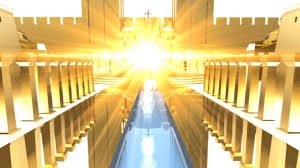 …el trono de Dios y del Cordero estará en ella, y sus siervos le servirán (22:3b), y reinará para siempre. Por lo tanto, sus siervos le servirán. Esto revela que el cielo no es un lugar de ociosidad, sino un lugar de actividad incesante. No será necesario descansar para darle al cuerpo la oportunidad de recuperarse. La palabra servicio es especial en el sentido de que fue utilizada por los judíos para denotar su servicio a Dios como Su pueblo especial. El escritor de los Hebreos dijo: El primero, pues, también tenía por su parte reglas de culto y el santuario terrenal…Dispuestas así estas cosas, en la primera estancia ciertamente entraban continuamente los sacerdotes para cumplir los ritos (Hebreos 9:1 y 6). Será un servicio especial para ADONAI que usted y yo realizaremos en el Estado Eterno. ¿Qué será? No lo sabemos. Quizás a cada uno de nosotros se le asignará una galaxia entera para explorar y desarrollar para la gloria del SEÑOR. Recuerde que a Adán se le dio la responsabilidad de trabajar y cuidar el jardín perfecto del Edén (Génesis 2:15a). O tal vez cada uno continuará desarrollando el uso de los dones espirituales que teníamos mientras vivíamos en la vieja tierra. Pero sea lo que sea, al fin cumpliremos nuestro destino y satisfaremos los deseos de nuestro corazón.514
…el trono de Dios y del Cordero estará en ella, y sus siervos le servirán (22:3b), y reinará para siempre. Por lo tanto, sus siervos le servirán. Esto revela que el cielo no es un lugar de ociosidad, sino un lugar de actividad incesante. No será necesario descansar para darle al cuerpo la oportunidad de recuperarse. La palabra servicio es especial en el sentido de que fue utilizada por los judíos para denotar su servicio a Dios como Su pueblo especial. El escritor de los Hebreos dijo: El primero, pues, también tenía por su parte reglas de culto y el santuario terrenal…Dispuestas así estas cosas, en la primera estancia ciertamente entraban continuamente los sacerdotes para cumplir los ritos (Hebreos 9:1 y 6). Será un servicio especial para ADONAI que usted y yo realizaremos en el Estado Eterno. ¿Qué será? No lo sabemos. Quizás a cada uno de nosotros se le asignará una galaxia entera para explorar y desarrollar para la gloria del SEÑOR. Recuerde que a Adán se le dio la responsabilidad de trabajar y cuidar el jardín perfecto del Edén (Génesis 2:15a). O tal vez cada uno continuará desarrollando el uso de los dones espirituales que teníamos mientras vivíamos en la vieja tierra. Pero sea lo que sea, al fin cumpliremos nuestro destino y satisfaremos los deseos de nuestro corazón.514 La ubicación de la calle, el río y el árbol es poco clara… a uno y otro lado del río, estaba el árbol de vida (21:1). Parece que el árbol es lo suficientemente grande como para atravesar el río, por lo que el río está en el medio de su calle, y el árbol está a ambos lados del río. Ahora veremos el árbol de la vida que existía en el jardín del Edén (Génesis 2:9, 3:11, 22-24). Se caracterizará por la productividad, con doce tipos de fruta cada mes del año.506 Así como Jesús comió y bebió después de ser resucitado de entre los muertos, los creyentes comerán y beberán en la Ciudad Santa. El hecho de que los meses se identifiquen como tales en la Nueva Jerusalén indica que los movimientos orbitales y de rotación de la tierra continuarán como Dios estableció en el comienzo y que la luna continuará orbitando alrededor de la tierra.507
La ubicación de la calle, el río y el árbol es poco clara… a uno y otro lado del río, estaba el árbol de vida (21:1). Parece que el árbol es lo suficientemente grande como para atravesar el río, por lo que el río está en el medio de su calle, y el árbol está a ambos lados del río. Ahora veremos el árbol de la vida que existía en el jardín del Edén (Génesis 2:9, 3:11, 22-24). Se caracterizará por la productividad, con doce tipos de fruta cada mes del año.506 Así como Jesús comió y bebió después de ser resucitado de entre los muertos, los creyentes comerán y beberán en la Ciudad Santa. El hecho de que los meses se identifiquen como tales en la Nueva Jerusalén indica que los movimientos orbitales y de rotación de la tierra continuarán como Dios estableció en el comienzo y que la luna continuará orbitando alrededor de la tierra.507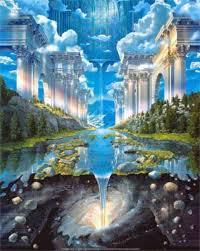 Y la ciudad no tiene necesidad del sol ni de la luna para que la iluminen, porque la gloria de Dios la iluminó, y el Cordero es su lumbrera (21:23); sería inapropiado que la Nueva Jerusalén cayera bajo la oscuridad de la noche, vea también Primera de Juan 1:5. En la naturaleza intrínseca del SEÑOR, Él vive en una luz inaccesible, que nadie ha visto ni puede ver (Primera Timoteo 6:16), al menos en un cuerpo natural antes de la primera resurrección (20:5-6). Así como la gloria Shekinah del Señor llenó el antiguo Templo (Primera Reyes 8:10-11), y luego llena el Templo Milenial (Hageo 2:7-9; Ezequiel 44:4), también lo hará Su gloria Shekinah iluminando la Nueva Jerusalén en el Estado Eterno.
Y la ciudad no tiene necesidad del sol ni de la luna para que la iluminen, porque la gloria de Dios la iluminó, y el Cordero es su lumbrera (21:23); sería inapropiado que la Nueva Jerusalén cayera bajo la oscuridad de la noche, vea también Primera de Juan 1:5. En la naturaleza intrínseca del SEÑOR, Él vive en una luz inaccesible, que nadie ha visto ni puede ver (Primera Timoteo 6:16), al menos en un cuerpo natural antes de la primera resurrección (20:5-6). Así como la gloria Shekinah del Señor llenó el antiguo Templo (Primera Reyes 8:10-11), y luego llena el Templo Milenial (Hageo 2:7-9; Ezequiel 44:4), también lo hará Su gloria Shekinah iluminando la Nueva Jerusalén en el Estado Eterno.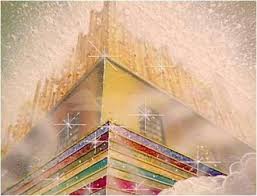 La Ciudad Santa será como ninguna otra ciudad. La más grande de todas las ciudades humanas había sido la poderosa Babilonia la Grande, vestida de púrpura y escarlata, y adornada de oro y piedras preciosas y perlas (17:4a). La Nueva Jerusalén, por otro lado: tiene la gloria de Dios: su fulgor es semejante a una piedra preciosísima, como piedra jaspe, transparente como el cristal (21:11), la gloria de Dios ó Shekinah. La palabra jaspe en la antigüedad no se limitaba al tipo de piedra que hoy llamamos jaspe, sino que describía una piedra translúcida. Por lo tanto, la Nueva Jerusalén se representa como un diamante enorme e impecable, que refracta la gloria Shekinah, o la manifestación visible de Dios, en todo el cielo nuevo y la tierra nueva.
La Ciudad Santa será como ninguna otra ciudad. La más grande de todas las ciudades humanas había sido la poderosa Babilonia la Grande, vestida de púrpura y escarlata, y adornada de oro y piedras preciosas y perlas (17:4a). La Nueva Jerusalén, por otro lado: tiene la gloria de Dios: su fulgor es semejante a una piedra preciosísima, como piedra jaspe, transparente como el cristal (21:11), la gloria de Dios ó Shekinah. La palabra jaspe en la antigüedad no se limitaba al tipo de piedra que hoy llamamos jaspe, sino que describía una piedra translúcida. Por lo tanto, la Nueva Jerusalén se representa como un diamante enorme e impecable, que refracta la gloria Shekinah, o la manifestación visible de Dios, en todo el cielo nuevo y la tierra nueva.
 Y vino uno de los siete ángeles que tienen las siete copas llenas de las siete plagas postreras, y habló conmigo, diciendo: Ven, te mostraré la novia, la esposa del Cordero (21:9). Escolta de Juan en un tour personal por la capital de los cielos, el ángel vino y le dijo al viejo apóstol: “Ven, te mostraré la novia, la esposa del Cordero”. La Ciudad Santa tendrá árboles, calles y mansiones, pero su verdadera identidad será el Cordero y Su Novia. La Nueva Jerusalén se describe como una novia porque tiene el carácter de su gente. Esas personas forman la Novia del Cordero, un título originalmente dado a la Iglesia (19:7). Sin embargo, como David Stein escribe en su Comentario judío del Nuevo Testamento, no hay una Iglesia separada del pueblo judío ni Israel separado del Nuevo Pacto. Todos los de fe, tanto judíos como gentiles, conformarán la Novia. A medida que nos acercamos al final del libro de Apocalipsis, la figura del Cordero se vuelve cada vez más prominente. En los próximos veintidós versículos Él se menciona siete veces.485
Y vino uno de los siete ángeles que tienen las siete copas llenas de las siete plagas postreras, y habló conmigo, diciendo: Ven, te mostraré la novia, la esposa del Cordero (21:9). Escolta de Juan en un tour personal por la capital de los cielos, el ángel vino y le dijo al viejo apóstol: “Ven, te mostraré la novia, la esposa del Cordero”. La Ciudad Santa tendrá árboles, calles y mansiones, pero su verdadera identidad será el Cordero y Su Novia. La Nueva Jerusalén se describe como una novia porque tiene el carácter de su gente. Esas personas forman la Novia del Cordero, un título originalmente dado a la Iglesia (19:7). Sin embargo, como David Stein escribe en su Comentario judío del Nuevo Testamento, no hay una Iglesia separada del pueblo judío ni Israel separado del Nuevo Pacto. Todos los de fe, tanto judíos como gentiles, conformarán la Novia. A medida que nos acercamos al final del libro de Apocalipsis, la figura del Cordero se vuelve cada vez más prominente. En los próximos veintidós versículos Él se menciona siete veces.485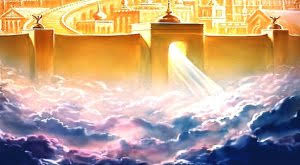 La noche antes de Su muerte, Jesucristo hizo una promesa maravillosa a todos los que tienen fe, confianza y creen en él. Él dijo:
La noche antes de Su muerte, Jesucristo hizo una promesa maravillosa a todos los que tienen fe, confianza y creen en él. Él dijo: 
 Aunque será necesario crear el cielo nuevo y la tierra nueva, la Nueva Jerusalén no lo será, porque ya existe en el cielo donde reside el Tabernáculo celestial (Hebreos 8:5; Apocalipsis 15:5). Hace mucho tiempo el SEÑOR les dijo a los hijos de Israel: Pondré mi Tabernáculo en medio de vosotros, y mi alma no os abominará (Levítico 26:11). Fue cierto por un tiempo en el desierto, y fue cierto por un tiempo en la Tierra Prometida. Pero cuando la Nueva Jerusalén descienda del cielo, será verdad por toda la eternidad.
Aunque será necesario crear el cielo nuevo y la tierra nueva, la Nueva Jerusalén no lo será, porque ya existe en el cielo donde reside el Tabernáculo celestial (Hebreos 8:5; Apocalipsis 15:5). Hace mucho tiempo el SEÑOR les dijo a los hijos de Israel: Pondré mi Tabernáculo en medio de vosotros, y mi alma no os abominará (Levítico 26:11). Fue cierto por un tiempo en el desierto, y fue cierto por un tiempo en la Tierra Prometida. Pero cuando la Nueva Jerusalén descienda del cielo, será verdad por toda la eternidad.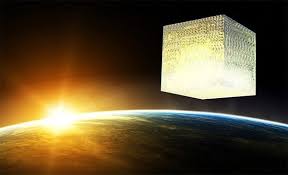 El Reino Mesiánico en sí mismo tiene solo mil años. Sin embargo, de acuerdo con las promesas del Pacto de Dios con David (vea el comentario sobre
El Reino Mesiánico en sí mismo tiene solo mil años. Sin embargo, de acuerdo con las promesas del Pacto de Dios con David (vea el comentario sobre 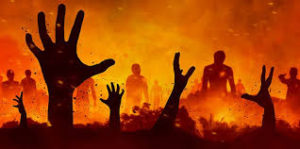 El lago de fuego es la segunda muerte (20:14b). Este será el final de la primera muerte: la muerte física. Esta es una buena noticia para los creyentes, pero una noticia horrible para los perdidos. Cuando ellos resuciten de entre los muertos, querrán morir físicamente, pero tendrán nuevos cuerpos resucitados que no pueden ser destruidos en el lago de fuego. Como resultado, su sufrimiento será eterno. Cuando la tierra sea destruida, las personas estarán en uno de dos lugares: la Nueva Jerusalén, o el lago de fuego.471
El lago de fuego es la segunda muerte (20:14b). Este será el final de la primera muerte: la muerte física. Esta es una buena noticia para los creyentes, pero una noticia horrible para los perdidos. Cuando ellos resuciten de entre los muertos, querrán morir físicamente, pero tendrán nuevos cuerpos resucitados que no pueden ser destruidos en el lago de fuego. Como resultado, su sufrimiento será eterno. Cuando la tierra sea destruida, las personas estarán en uno de dos lugares: la Nueva Jerusalén, o el lago de fuego.471 Y vi a los muertos, grandes y pequeños, en pie delante del trono, y unos rollos fueron abiertos, y también fue abierto otro rollo, el cual es de la vida; y fueron juzgados los muertos por las cosas que habían sido escritas en los rollos, según sus obras (20:12). Sin embargo, los muertos resucitados, se representan de pie delante del trono del juicio divino. Estos no son simplemente los muertos de la última rebelión de Satanás al final del Milenio, sino que incluirán a todos los incrédulos que alguna vez vivieron (
Y vi a los muertos, grandes y pequeños, en pie delante del trono, y unos rollos fueron abiertos, y también fue abierto otro rollo, el cual es de la vida; y fueron juzgados los muertos por las cosas que habían sido escritas en los rollos, según sus obras (20:12). Sin embargo, los muertos resucitados, se representan de pie delante del trono del juicio divino. Estos no son simplemente los muertos de la última rebelión de Satanás al final del Milenio, sino que incluirán a todos los incrédulos que alguna vez vivieron ( Finalmente, otro libro mencionado en la Biblia es el libro de la vida del Cordero. Este libro solo contiene los nombres de aquellos que nacieron de nuevo. Curiosamente, sus nombres fueron escritos en este libro antes de que la tierra fuera creada (13:8; 17:8b). Debido a las nueve cosas que el SEÑOR hace por nosotros en el momento de la fe (vea el comentario sobre
Finalmente, otro libro mencionado en la Biblia es el libro de la vida del Cordero. Este libro solo contiene los nombres de aquellos que nacieron de nuevo. Curiosamente, sus nombres fueron escritos en este libro antes de que la tierra fuera creada (13:8; 17:8b). Debido a las nueve cosas que el SEÑOR hace por nosotros en el momento de la fe (vea el comentario sobre